“Tras el vivir y el soñar, está lo que más importa: el despertar.” (Beyond living and dreaming, what matters most is waking up). Antonio Machado, Seville-born poet, playwright and flamenco aficionado
I was sitting at the dining table eating a light lunch in the apartment I was renting in Sevilla, where I had been living for three months. It was an ordinary moment. I was just on a break between flamenco dance classes when this thought popped into my head.
Here I am. No job, no permanent home, no romantic partner. And I’ve never been happier in my life.
It was a surprising thought, but not a huge a-ha. It felt more like an obvious truth making itself conscious for the first time. A flash of insight, born out of the accumulation of many tiny moments. I was peaceful, in a state of relaxed wonder. I didn’t have any of those things. And yet, nothing was missing. Everything was perfect.
I was in Sevilla because I was studying flamenco full-time during a sabbatical year. Three months earlier, it had felt natural — even necessary— to travel the six hours by train and three hours by bus to Sevilla. The Spanish border was closed due to the pandemic, except for essential travel. The bus was full, and everyone was a bit anxious when we stopped at the border. The Border Patrol entered the bus and checked the passports of every bus passenger to my front, back and side - except mine. I was ready to explain why learning to dance flamenco was essential, but I was relieved to go unnoticed. It was a good start.
A few months back — while still walking on crutches and healing a fractured foot— I decided to enroll in a well-known flamenco arts school. I had been studying flamenco for about 10 years in the US, and it had been an old dream of mine to study in Spain. My doctor had assured me I would be recovered by the time class would start, so I registered thinking this would be so much fun. It was not until I was in school getting my butt kicked four hours a day that I realized this was the Harvard of Flamenco. A place famous for grooming the next generation of professional flamenco guitarists, singers and dancers. For the past 10 years, I had been squeezing in as much flamenco as possible into the crevasses of my life in San Francisco, and I was even performing regularly. But this was another league altogether. My feet had blisters, my knees hurt, and my shoes had holes from all the footwork. I was struggling to keep up.
But I had one thing going for me: cojones.
Turns
On Mondays and Wednesdays, the first class was dedicated to turns. Ninety minutes of piroutettes, deboules, vueltas de tacon, quebradas, singles, doubles, en dedans, en dehors, you name it. I recorded at least 15 different combos. Turns are something you need to practice all the time, a use-it-or-lose-it situation. The women in my class (who were 10 –15 years my junior) had been working on turns for the last year. I hadn’t been dancing for a year, and a string of recent falls had left me with a fear for anything requiring balance. Whenever I attempted a turn, my whole body would go weak and I felt helpless in the throes of disequilibrium.
I was determined to conquer this fear. Over the next few months, I worked with 3 teachers and practiced by myself after class. The good news was, I discovered what I was doing wrong. The bad news was, the list was long:
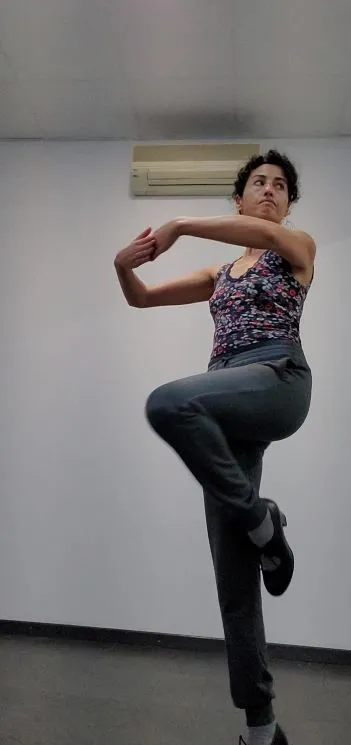
a) “your shoulders are too tense, your chest too collapsed”
b) “you don’t have enough leg muscle”
c) “your releve’ is too low, your passe’ too far back”
d) “your hands fold in a weird way at the wrist”
e) “your head isn’t turning fast enough”
f) “you’re not engaging your core”
g) “you’re not breathing”
After months of practice, my body miraculously produced a double turn. It felt like a gift from the divine. It was warm butter, it was pure honey dripping from a ripe fig! I was freedom incarnate. I know why the Dervishes whirl.
I left Sevilla months ago, and I continue to practice turns by myself, working on a) through g). I miss the support of a teacher and other students in the room. At the same time, I feel the comfort of the daily routine, the walk to the studio, the warm up rituals, the particular song I use for each exercise. I seek that perfect moment, and in the seeking I have found joy.
La Calo’
Living in the Sevilla city center is like living inside a 16th century history museum. Building doors are my favorite architectural element, made of thick old wood with metal studs sprinkled all over, like polka dots on a flamenco skirt. Behind the massive doors of those buildings were the traditional Andalucian patios with beautiful tiles and indoor gardens.
My apartment building had a beautiful wooden door. The lock was a little stuck, so you had to get the key in just so and give it the right twist for the heavy mechanism to surrender. I always held my breath a little, afraid that this might be the time when I was going to get locked out. A nice exhale right before turning the key always did the trick, though. And then I was rewarded by the cool entrance lobby, protected from the June heat which was starting to announce “la calo’ ”. This is what Sevillanos call the heat that hits the city from late June to September. It’s a heat so strong that needs its own name. Any other time of the year, you would say “el calor”, a male gender word. During the summer, heat changes gender from male to female. La calo’ . The powerful feminine, making us all go inside, disrobe and cool down.
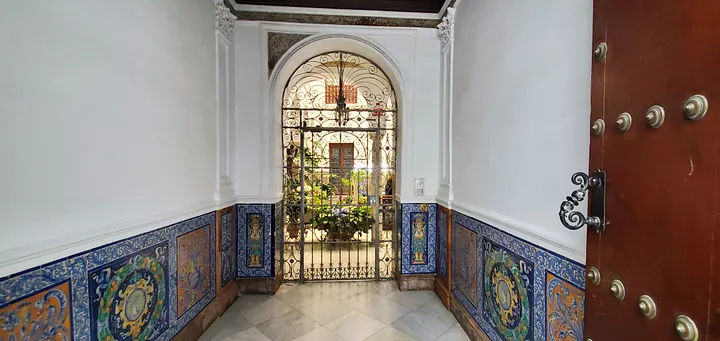
Magenta Pants
Walking was my main means of transportation in Sevilla. Every morning, I would walk the 30 minutes from the Alfalfa neighborhood where I lived to the school in Triana. I loved that walk. I watched the world wake up, people starting their day with cafe y tostada in the plaza cafe, others going to church, or opening their businesses… The highlight was crossing the Triana bridge. First, admiring the giant buganvilia and jacaranda tree at the foot of the bridge, glistening in the sun. Then checking out the rowers gliding down the dark waters of the Guadalquivir, dancers in their own right. And then, at exactly 9:50am, I would cross paths with a woman wearing the same magenta pants every day, always talking on the phone and rushing to what I assumed was her job at a boutique downtown. She reminded me of myself, so often rushing to cross to the other side of my life.
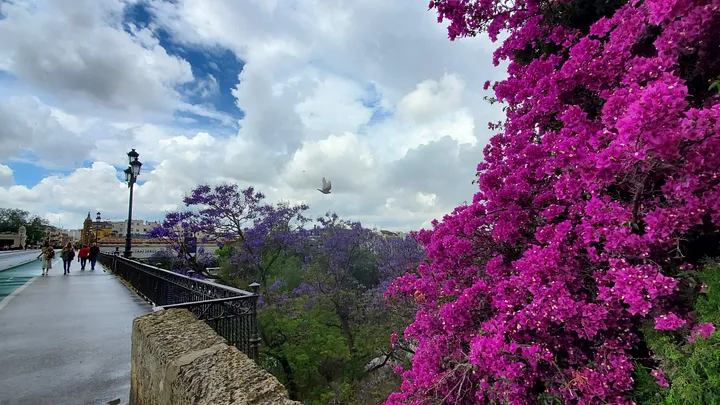
After morning class, I would go to the Mercado De Triana for lunch at Obrador La Osa, a small home made food stall owned by a tiny, rosy-cheeked woman called Lola. While I waited for my food, she would encouraged me to put my smartphone away and browse one of the children’s books on the counter instead.
On the way back to school, I would stop by the bakery and buy some crunchy bread for the next day. On that same street was my favorite bodega, La Antigua Abaceria. As soon as pandemic restrictions relaxed, this place would fill up for dinner around 10:30 PM. It was tiny, jamones hanging from the ceiling, wood paneling everywhere, old photos of flamenco dancers and toreros, and one guy taking care of everything. It enveloped me in good cheer. I can still taste the cured cod topped with thick orange slices, fennel and lots of olive oil.
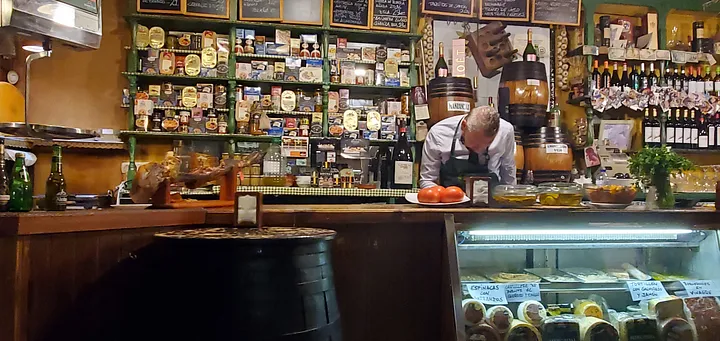
And so it was, for weeks and weeks. I was surrounded by beauty. I spent most of my day moving at a pace that felt my own. I owned my time, how I spent it, and whom I spent it with.
Why does it take exiting life as we know it in order to experience it fully? Maybe it’s the human condition. We can get so used to things that we don’t even notice them anymore, regardless of whether they’re joyful of painful. Stepping away and slowing down the movie of my life helped me luxuriate in the details. I had enough time to really notice and take them in. I still believe that purposeful work, romantic love, and a nice home contribute to happiness. During my time in Sevilla, I discovered that movement, beauty and unstructured time are even more fundamental. They help me experience life more fully.
Never Alone
Having moved a few times in my life, I am used to making new friends. It takes initiative and persistence. I tried that in Sevilla but it didn’t work as well as in the past. I would invite people to get together and they would cancel last minute. I would meet friends of friends, really interesting and creative people, but that pull for regular contact wouldn’t kick in. I joined my classmates at the café around the corner where students would hang out after class, but the conversation would gravitate often around gossip.
I decided to stop trying. There was loneliness for a while. Especially because Sevilla is such a gregarious city. Even in the pandemic, the streets are filled with couples and groups having drinks or sharing meals at cafes and restaurants. Eating by myself felt like I was breaking the law. I commented this with a local who agreed that this is almost an aberration in Sevillian culture. So weird that it is used as an idiom to describe a not-so-friendly person (“ese come la tapa solo”). I got so used to my own company that at a certain point I started feeling like there was someone always there. An easy going companionship. I was, in fact, never alone.
As soon as I stopped trying to make friends, slowly people started approaching me. I was blessed with three good friends, with whom I would regularly go out to dinner, see flamenco shows and have meaningful conversations.
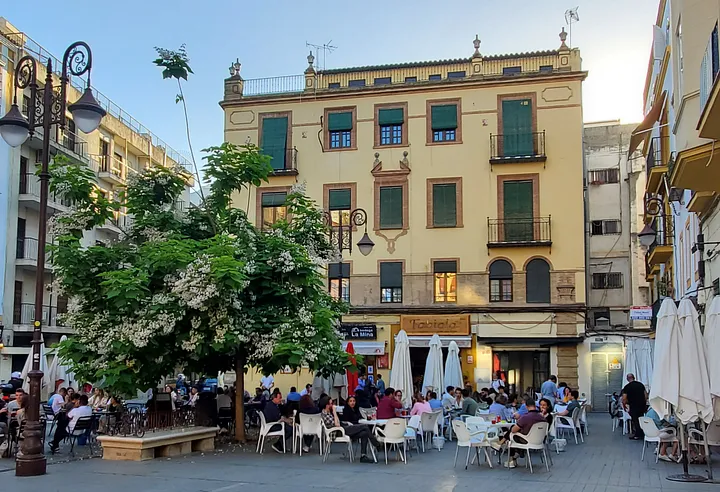
An Ongoing Dance
People often ask me what I got out of my sabbatical in Spain. Was it worth leaving it all behind? Am I a new person? Or are the old habits back?
Of course, they are. After all, they fit me so well, after years of indenting themselves into my flesh. What I do notice is that I am more attuned and present.
Let me illustrate. A few weeks after I left Sevilla, I went to the doctor’s. I’m sitting in the waiting room when I feel pulled to look to my right. I see an older lady leaning against the wall by the restroom door. My first reaction is, “oh, just someone waiting for their turn”. And usually, I would leave it at that. But something felt off this time. Without thinking, I got up and walked up to her. I asked, are you ok. ”No, I am a bit dizzy, my husband is in the waiting room, can you help me get back?”. We walked back together. Had I been on my phone as usual when killing time, or dismissed my hunch as I do often, I would have missed this opportunity to help.
I am happy that I gave myself a chance to be free and live the flamenco dream in Sevilla. I’m glad I didn’t let guilt fool me into believing that it was selfish to do so. No-one got hurt. In fact, I think everyone benefitted.
